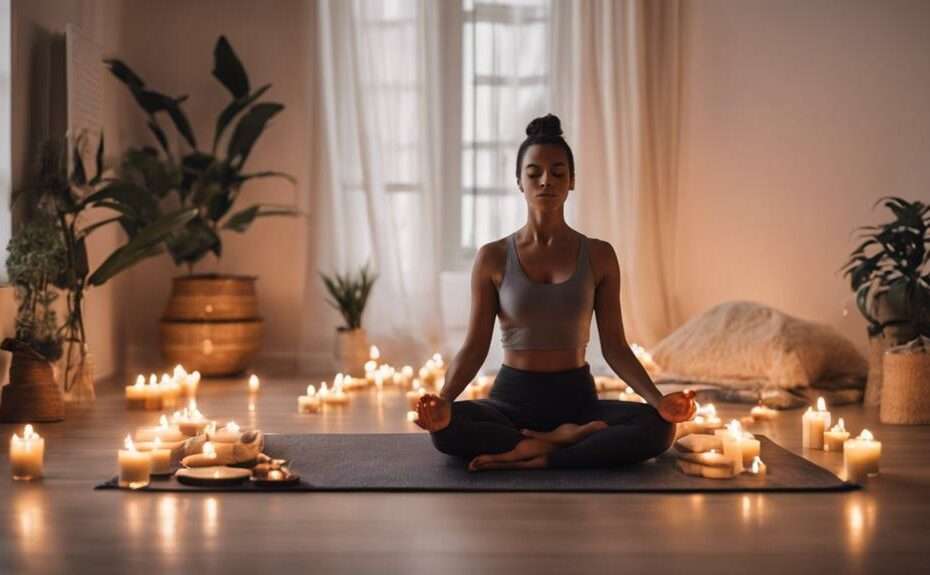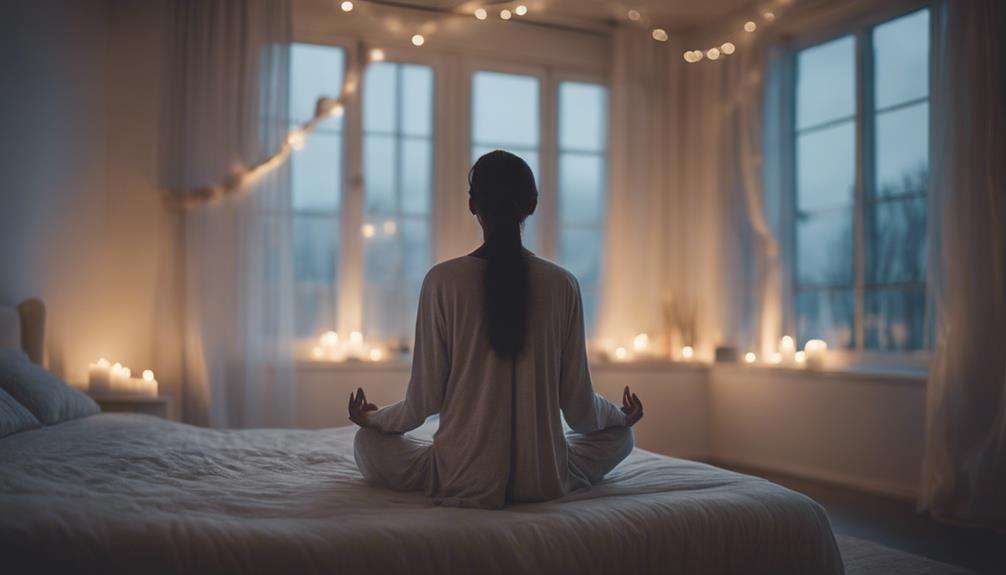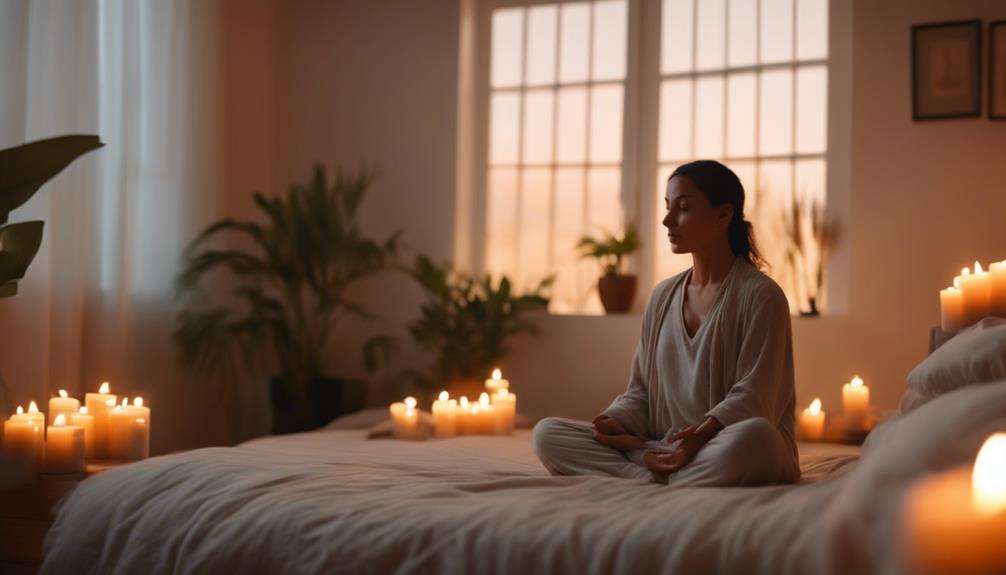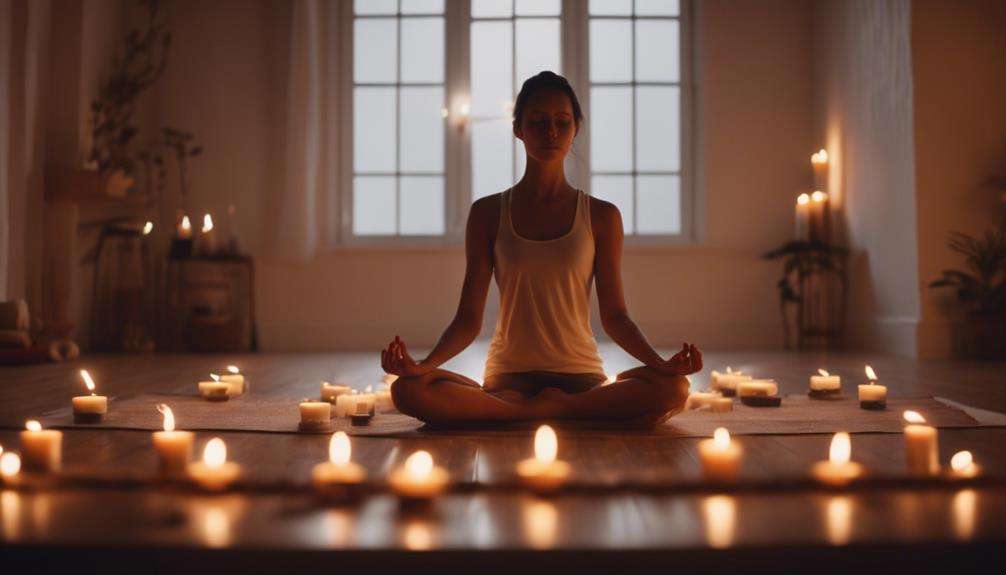If you've ever struggled with restless nights, incorporating yoga and meditation into your routine might be the key to improving your sleep quality. By focusing on specific poses and mindfulness techniques, you can create a calming bedtime ritual that prepares both your body and mind for a peaceful slumber.
But there's more to it than just physical relaxation; these practices can also help address underlying stress and anxiety that may be disrupting your sleep.
So, how exactly can these 7 tips transform your nightly rest?
Key Takeaways
- Deep breathing and mindfulness in yoga and meditation improve sleep quality by reducing stress and promoting relaxation.
- Incorporating meditation techniques enhances sleep onset latency and overall sleep efficiency.
- Creating a calm sleep environment with dim lights and soothing sounds supports melatonin production and a restful sleep.
- Mindfulness practices before bed, like body scan meditation, aid in reducing anxiety and improving sleep-wake cycles.
Importance of Yoga for Sleep Quality
Enhance your sleep quality through the importance of incorporating yoga into your daily routine.
Yoga offers a holistic approach to improving sleep by combining physical postures, breathing exercises, mindfulness, and relaxation techniques. By engaging in a regular yoga practice, you can effectively enhance the quality of your sleep.
The focus on deep breathing during yoga helps calm the mind and relax the body, making it easier to fall asleep and stay asleep throughout the night.
The practice of yoga also aids in reducing stress levels, which is a common factor that disrupts sleep. By incorporating yoga into your daily routine, you can alleviate anxiety and worry, creating a more peaceful state of mind conducive to better sleep quality.
Additionally, the mindfulness cultivated through yoga promotes the production of melatonin, a hormone essential for regulating sleep patterns.
Understanding Insomnia Symptoms and Causes
To understand insomnia symptoms and causes, it's essential to recognize the various factors that contribute to this common sleep disorder. Insomnia, affecting 10%-22% of the population, is often linked to anxiety and depression. Symptoms may manifest as difficulty falling asleep, staying asleep, or waking up too early, leading to poor subjective sleep quality. Stress, unhealthy habits, and irregular sleep patterns are significant contributors to insomnia.
Cognitive Behavioral Therapy for Insomnia (CBT-I) is the primary treatment for chronic cases, focusing on restructuring thoughts and behaviors around sleep. Additionally, mind-body interventions like Yoga have shown promise in improving sleep quality by promoting relaxation and reducing anxiety.
Incorporating Meditation for Better Sleep

To improve your sleep quality, consider incorporating meditation into your bedtime routine.
By calming your mind, relaxing your body muscles, and promoting the release of sleep hormones, meditation can help prepare you for a restful night's sleep.
Cultivating a sense of calm through meditation techniques like deep breathing and body scans may support better sleep patterns.
Calming the Mind
Incorporate meditation into your bedtime routine to calm your mind and promote better sleep quality. Mindfulness meditation is a powerful tool to reduce stress, decrease rumination, and improve sleep patterns.
By practicing meditation before bed, you can enhance relaxation and prepare your mind for restful sleep. Studies have shown that meditation can increase melatonin production, which helps regulate your sleep-wake cycles. Regular meditation practice can also improve sleep onset latency and overall sleep efficiency, leading to better quality sleep.
Embracing a meditation routine not only fosters a calm mind but also sets the stage for a night of rejuvenating rest. Prioritize this practice to experience the profound benefits it offers for your sleep and overall well-being.
Relaxing Body Muscles
Begin your journey towards better sleep by letting meditation guide you in relaxing your body muscles, ultimately promoting a peaceful and rejuvenating rest. Incorporating meditation techniques can help release muscle tension and promote deep relaxation, setting the stage for a restful night's sleep. Here are some ways meditation can assist in relaxing your body muscles:
- Mindful Body Scan: Engage in a body scan meditation to identify and release areas of tension, allowing for a more profound sense of relaxation.
- Progressive Muscle Relaxation: Combine muscle relaxation techniques with meditation to systematically relax different muscle groups and alleviate overall muscle tension.
- Tension Release: Use meditation as a tool to release stored tension in your muscles, creating a state of calmness conducive to better sleep quality.
- Bedtime Routine: Establish a calming bedtime routine that includes meditation for consistent muscle relaxation and improved sleep.
Promoting Sleep Hormones
Enhance your sleep quality by harnessing the power of meditation to boost the production of sleep hormones naturally.
Meditation has been linked to increased melatonin levels, crucial for regulating deep sleep cycles and improving overall sleep quality.
By practicing mindfulness meditation, you can effectively reduce stress levels, promoting relaxation and aiding in falling asleep more easily.
Integrating meditation into your bedtime routine can enhance sleep efficiency, reducing the time it takes to drift off.
Consistent meditation practice has been shown to lead to improved sleep duration and quality.
Embracing meditation as a tool for promoting sleep hormones not only fosters relaxation but also contributes to better sleep patterns, ultimately enhancing your overall well-being through enhanced restful sleep.
Yoga Poses for Relaxation and Sleep
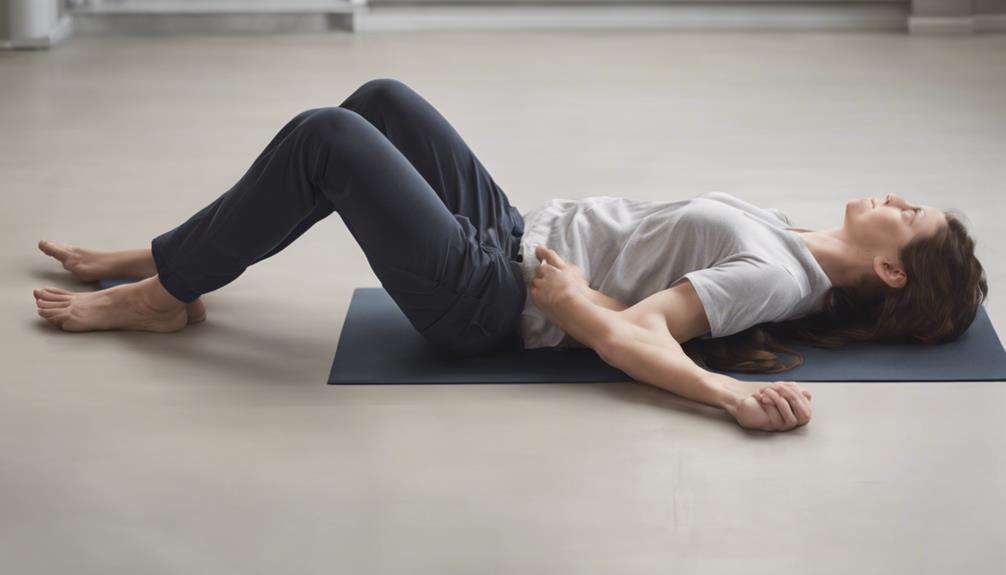
For promoting relaxation and improving your sleep quality, practicing yoga poses like Balasana and Uttanasana can be highly beneficial. These poses help in calming the mind and releasing tension from your body, setting the stage for a restful sleep.
To enhance your bedtime routine further, consider incorporating the following yoga poses:
- Supta Baddha Konasana: This pose can help ease tension in your body, particularly in areas like the hips and lower back, promoting relaxation before bedtime.
- Viparita Karani: By elevating your legs up the wall, this pose encourages blood circulation and relaxation, aiding in a peaceful transition to sleep.
- Ardha Uttanasana at the wall: Practicing this pose can promote deep breathing and help release any remaining stress or tightness in your body before you hit the hay.
- Savasana: The ultimate relaxation pose, Savasana allows you to unwind completely, preparing your body and mind for a night of restful sleep.
Incorporating these yoga poses into your bedtime routine can contribute to an overall sense of well-being and improve the quality of your sleep.
Establishing a Bedtime Routine
Establish a calming bedtime routine incorporating yoga and meditation to signal your body that it's time to wind down and prepare for a restful night's sleep. By engaging in gentle yoga poses and deep breathing exercises before bed, you can effectively reduce stress and anxiety, setting the stage for better relaxation and improved sleep quality. Studies indicate that practicing meditation pre-sleep can boost melatonin production, a crucial hormone for regulating sleep-wake cycles, leading to a more restorative slumber.
Enhance the effectiveness of your bedtime routine by creating a tranquil environment with soft lighting, soothing music, and cozy bedding. Consistency is key; regular practice of your bedtime yoga and meditation routine conditions both your body and mind for a peaceful night's sleep. Embrace this routine as a time for self-care and relaxation, allowing yourself to let go of the day's worries and tensions, paving the way for a night of rejuvenating and peaceful sleep.
Mindfulness Practices Before Sleep

As you wind down for the night, embracing mindfulness practices like yoga and meditation can gently guide your mind and body towards a state of relaxation conducive to restful sleep. Engaging in deep breathing exercises, yoga poses, and other mindfulness practices before sleep offers a range of benefits for your sleep quality:
- Stress Reduction: By focusing on the present moment, you can alleviate stress and tension accumulated throughout the day.
- Anxiety Levels: Practicing mindfulness activities can help lower anxiety levels, allowing for a more peaceful transition into sleep.
- Relaxation: Yoga poses and deep breathing exercises promote relaxation, signaling to your body that it's time to unwind.
- Overall Sleep Quality: Incorporating mindfulness practices like meditation into your bedtime routine can enhance the quality and duration of your sleep, leading to a more rejuvenating rest.
Creating a Calm Sleep Environment
To create a calm sleep environment, consider dimming lights, selecting tranquil sounds, and keeping your bedroom clutter-free. These simple adjustments can promote relaxation and improve the quality of your sleep.
Dim Lighting Effects
Dim lighting in the evening creates a soothing ambiance that encourages your body to unwind and prepare for a restful night's sleep by stimulating melatonin production. Here are some tips to help you optimize your sleep environment:
- Avoid Bright Lights: Reduce exposure to bright light before bedtime to support melatonin production.
- Create a Relaxing Atmosphere: Dim the lights an hour before bed to signal relaxation to your body.
- Improve Sleep Quality: Lowering artificial light levels at night can enhance sleep quality and well-being.
- Regulate Circadian Rhythm: Dim lighting helps regulate your circadian rhythm, promoting a healthy sleep-wake cycle.
Tranquil Soundscape Selection
For creating a serene sleep environment, selecting tranquil sounds like nature sounds, white noise, or calming music is essential. These calming sounds have been shown to reduce stress, lower heart rate, and improve sleep quality, helping you achieve deep and restorative sleep.
Avoid loud or disruptive noises that can interfere with your relaxation and disrupt your sleep stages. Incorporating sound machines, apps, or specially curated playlists into your bedtime routine can enhance the peaceful sleep environment you desire.
Clutter-Free Bedroom Space
Create a serene sleep environment by decluttering your bedroom space, promoting relaxation and enhancing the quality of your rest. A clutter-free bedroom can significantly impact your sleep quality and overall well-being.
Here are four reasons why a clutter-free bedroom space is essential for peaceful sleep:
- Stress Reduction: Removing clutter can help reduce stress levels and create a sense of calmness.
- Enhanced Relaxation: A tidy space minimizes distractions, allowing you to unwind more effectively.
- Improved Sleep Quality: Studies indicate that a clutter-free environment leads to better sleep quality.
- Peaceful Sleep: Organizing your bedroom promotes feelings of comfort and tranquility, setting the stage for a restful night's sleep.
Embrace the benefits of a clutter-free space for better sleep and a healthier well-being.
Frequently Asked Questions
Does Yoga and Meditation Help Sleep?
Yoga and meditation can significantly enhance your sleep quality. Deep breathing and relaxation techniques before bedtime cultivate a mind-body connection, reducing stress and improving sleep patterns. Embracing evening practices like these can bring you valuable sleep benefits.
Can Yoga Make You Sleep Better?
Yoga poses, relaxation techniques, and breathing exercises can help you sleep better. Establishing a calming bedtime routine and optimizing your sleep environment foster a strong mind-body connection, reduce stress, and improve sleep patterns for effective insomnia treatment.
Does Meditation Improve Sleep Quality?
When you practice meditation, you enhance sleep quality by reducing stress, improving sleep patterns, and promoting relaxation. This mind-body connection offers benefits like mental clarity, deep breathing, and better sleep hygiene, aiding in managing sleep disturbances.
How Can I Improve My Sleep Quality?
To improve your sleep quality, focus on breathing exercises, a soothing bedtime routine, stress management, mind-body connection, relaxation techniques, a conducive sleep environment, evening stretches, good sleep hygiene, calming music, and the practice of yoga nidra.
Conclusion
In conclusion, incorporating yoga and meditation into your bedtime routine can greatly improve your sleep quality by reducing stress and promoting relaxation. By practicing calming yoga poses, deep breathing techniques, and mindfulness practices, you can create a peaceful environment for a restful night's sleep.
Remember, the key to better sleep lies in finding what works best for you and making it a consistent part of your bedtime routine. Sweet dreams await when you embrace the power of yoga and meditation.
